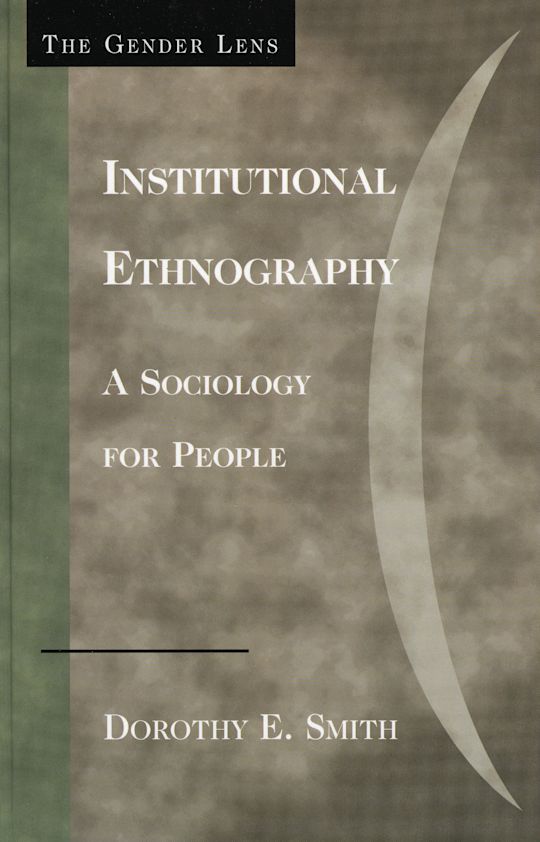Institutional Ethnography
A Sociology for People
- Textbook
Institutional Ethnography
A Sociology for People
- Textbook
Description
Prominent sociologist Dorothy Smith outlines a method of inquiry that uses everyday experience as a lens to examine social relations and social institutions. Concerned with articulating an inclusive sociology that goes beyond looking at a particular group of people from the detached viewpoint of the researcher, this is a method of inquiry for people, incorporating the expert's research and language into everyday experience to examine social relations and institutions. The book begins by examining the foundations of institutional ethnography in women's movements, differentiating it from other related sociologies; the second part offers an ontology of the social; and the third illustrates this ontology through an array of institutional ethnography examples. This will be a foundational text for classes in sociology, ethnography, and women's studies.
Table of Contents
Part 2 Part I. Making a Sociology for People
Part 3 Chapter 1. Women's Standpoint: Embodied Knowing versus the Ruling Relations
Chapter 4 Women's Standpoint and the Ruling Relations
Chapter 5 The Historical Trajectory of Gender and the Ruling Relations
Part 6 Chapter 2. Knowing the Social: An Alternative Design
Chapter 7 Reorganizing the Social Relations of Objectivity
Chapter 8 What is Institutional Ethnography? Some Contrasts
Chapter 9 Experience and the Ethnographic Problematic
Chapter 10 Conclusion
Part 11 Part II. An Ontology of the Social
Part 12 Chapter 3. Designing an Ontology for Institutional Ethnography
Chapter 13 An Ontology of the Social
Chapter 14 Institutions, Language, and Texts
Chapter 15 Conclusion
Part 16 Chapter 4. Language As Coordinating Subjectivities
Chapter 17 Reconceptualizing Language as Social
Chapter 18 Experiential and Text-based Territories
Chapter 19 Conclusion
Part 20 Part III. Making Institutions Ethnographically Accessible
Part 21 Chapter 5. Texts, Text-Reader Conversations, and Institutional Discourse
Chapter 22 The Text-reader Conversation
Chapter 23 The Text-reader Conversations of Institutional Discourse
Chapter 24 Texts as Institutional Coordinators
Chapter 25 Conclusion
Part 26 Chapter 6. Experience as Dialogue and Data
Chapter 27 Experience as Dialogue: The Problem
Chapter 28 An alternative understanding of experience as dialogue
Chapter 29 Experience, Language, and Social Organization
Chapter 30 The Data Dialogues
Chapter 31 Conclusion
Part 32 Chapter 7. Work Knowledges
Chapter 33 Work Knowledge of University Grades and Grading: A Mini- ethnography
Chapter 34 Work Knowledge as the Institutional Ethnographer's Data
Chapter 35 Work Knowledge
Chapter 36 Assembling and Mapping Work Knowledges
Chapter 37 The Problem of Institutional Capture
Chapter 38 Conclusion
Part 39 Chapter 8. Texts and Institutions
Chapter 40 How Texts Coordinate
Chapter 41 Conclusion
Part 42 Chapter 9. Power, Language, and Institutions
Chapter 43 Making Institutional Realities
Chapter 44 Regulatory Frames
Chapter 45 Conclusion
Part 46 Conclusion
Part 47 Chapter 10. Where We've Got to and Where We Can Go
Chapter 48 Where We've Got To
Chapter 49 Expansion
Chapter 50 The Collective Work of Institutional Ethnography
Part 51 Glossary
Part 52 Reference List
Part 53 Index
Part 54 About the Author
Product details
| Published | 03 Jun 2005 |
|---|---|
| Format | Ebook (Epub & Mobi) |
| Edition | 1st |
| Extent | 272 |
| ISBN | 9780759114814 |
| Imprint | AltaMira Press |
| Series | Gender Lens |
| Publisher | Bloomsbury Publishing |
Reviews

ONLINE RESOURCES
Bloomsbury Collections
This book is available on Bloomsbury Collections where your library has access.



































